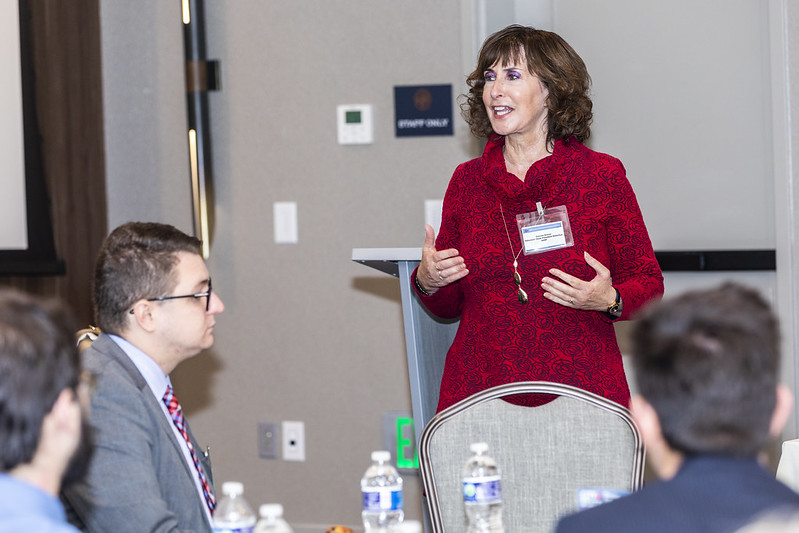AARP Hearing Center

AARP Pennsylvania State President Emeritus Joanne Grossi recently spoke at City & State PA’s Greater Philadelphia Healthcare Summit. The summit was meant to offer industry executives, public sector leaders and academics a full-day conference dedicated to fostering partnerships between the government and the private sector to improve the delivery of healthcare services. As an advocate and caregiver, Grossi offered a unique perspective at the conference as she delivered the following opening remarks on behalf of AARP Pennsylvania, which sponsored the summit.
Good morning. My name is Joanne Grossi, and I am the State President Emeritus of AARP Pennsylvania. I’m so happy to be here today to talk to you about caregiving. As a past state president of AARP Pennsylvania, I’ve seen firsthand how AARP is fighting for us. And as a family caregiver myself, I’ve had a front-row seat to the support AARP has given the more than 48 million family caregivers nationwide, including 1.6 million Pennsylvania caregivers, who help make it possible for older Americans and other loved ones to live independently at home—where they want to be.
For me, public health has been a lifelong career and a passion. In the field of public health, we need to do a better job of educating people to be able to advocate for their own health and those they love. My father, for example, was recently in the hospital. While he was in there, two surgeons came in the room one day and wanted my consent for a surgery I didn’t completely understand – but it involved potentially amputating part of my father’s foot. I told them I would not give consent. I wanted to do research on it first. I went home that night and researched every vascular surgeon in the health system and picked the surgeon in the health system I wanted to do the surgery for my father. The next day, I gave the recommendation. That’s the surgeon who did it, and she didn’t need to amputate any toes.
I think it’s important that we educate people on the importance of advocacy. In public health, we put great effort in educating people on the importance of prevention – getting a flu shot; wearing a seat belt, getting a colonoscopy, but we don’t teach people how to be advocates for themselves and the people they love.
Certainly, from AARP and my own career, I’ve done research on the effects of surgery on the elderly. I’ve researched this as president of AARP Pennsylvania, what anesthesia does to seniors. I know the detrimental effects.
Since that time – this all happened in October – my father’s recovery has been shorter and better than it would have been otherwise. He’s walking.
As advocates, we have to do a better job of making sure people understand that which public health system they use matters. Where you go matters for your health care. What health system you use, and what hospital you go to: That matters. When you have someone in the hospital, you have to question the doctors. They are not Gods. You have a right to question them; you have the right to say no and ask questions. And if you can, in a non-emergency situation, don’t let them pressure you. You can say, ‘I need to think about this’ and do some research.
This is just one piece of my life as my father’s caretaker. As President and now President Emeritus of AARP Pennsylvania, I’ve worked with our team to recommend commonsense solutions for family caretakers. Things like help at home, flexibility at work and financial relief. We can make family caregivers’ big responsibilities a little bit easier.
The new National Strategy to Support Family Caregivers from the Department of Health and Human Services -- Created due to AARP’s advocacy -- identifies 500 tangible actions that the federal government, state, local and other stakeholders can take to support family caregivers.
This strategy was co-developed by an advisory council created after the AARP-backed RAISE Family Caregivers Act was signed into law in 2018.
But we’re not done.
AARP will continue fighting at the state and federal levels to:
- Make providing care easier for family caregivers through better access to resources; training, education and inclusion in care; and more support at home.
- Alleviate the economic, financial and other challenges directly associated with caregiving responsibilities through financial relief, workplace flexibility and more access to respite care.
- Preserve and improve the general health and well-being of family caregivers through culturally inclusive caregiver assessments to identify needed support.
Here’s something that AARP understands that often gets overlooked: Family caregivers are the backbone of a broken long-term care system, saving the state—and taxpayers—billions each year.
The unpaid care family caregivers provide is valued at $470 Billion a year—more than all out-of-pocket spending on U.S. health care ($366 billion in 2017).
They also spend more than $7,000 every year on caregiving expenses.
Caregivers give so much to our families, friends, and our country. AARP is making sure we’re all getting the recognition we deserve.
AARP will continue providing best-in-class information for family caregivers, including Caregiver Resource Guides in every state, and resources for employers to better support their workers who are family caregivers.
For AARP Pennsylvania’s Caregiving Resources, click here.































































